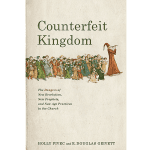What Christmas Is Not About
Around this time of year a slew of videos, articles and blogs are usually produced, all trying to say something important about Christmas. Some will decry, as has been the trend for decades, the blatant commercialization of Christmas. These will argue that our obsession with material goods takes away from the “true spirit” of the holiday. What that “true spirit” is, however, is often left vague. Usually it has something to do with families and friendships, listening to nostalgic music, imagining an idealized, Victorian-era setting and enjoying some overall good cheer. All in all, Christmas is about a kind of wholesome hedonism, but a hedonism nonetheless.
Others, more historically minded, will decry Christmas as a pagan holiday. It will be argued by these apologists that Christians of good faith should reconsider celebrating the holiday due to its obviously non-Christian roots (which, by the way, is patently false when it comes to the dating of Christmas). Still others will try to be novel in their thinking about Christmas, suggesting some pseudo-gnostic, esoteric interpretation of the birth of Jesus. Finally, there will be articles defending Christmas as a time for society to evoke the better angels of its nature. These will demand readers see Christmas as a time for recommitting to the never-ending work of social justice; to brotherly, sisterly, and non-binarily love; to total equality in all things; and to canceling any and everybody who disagrees with you, regardless of whether it is Christmas or not (this will obviously upset those writing about nostalgic Christmases full of wholesome, good cheer).
Christmas articles like these may all contain some valid points about the holiday. However, very few of them will even begin to touch on the main point. In fact, many of them will be entirely ignorant of that point. Or, they might know it, but neglect to really mention it for the sake of keeping the peace. Still others will so obscure the main point, that what is written or said will really only be about Christmas as a social practice and little more. In short, few commentaries about Christmas will be about the actual truth, fact or meaning of Christmas. They will hardly touch on the nature of Christmas. The reason for this is because they will not speak about Christmas theologically, even if they see Christmas as a religious holiday.
As such, the commentaries decrying the commercialization of the holiday, will fail to point out exactly what it is that that commercialization leads us away from. It isn’t just “good cheer” or “good times,” or even a sense of community that the commerciality of Christmas affects. It is that, but also so much more. In addition, the endless debates about whether or not Christmas was stolen (or better said, appropriated) from pagan, religious traditions are at some point superfluous. The variety of ways one celebrates the day are far less significant than knowing what the day truly commemorates.
As to the gnostics among us who never seem to grow tired of trying to be different or new, these commentaries on Christmas will not only fail the test of Scripture, they will also fail the test of history. For nothing really novel exists in any of these new-age fantasies, whether they were written by Basilides in the 2nd century, or some new-ager today. Finally, the social justice appropriation of the baby Jesus will miss the point even more than the rest, the hackneyed Marxist reduction of Jesus to the first revolutionary having long since run its course.
This is all quite a critique, one might say. So much so that the obvious question then emerges: if not these, then what is Christmas really about? We can answer this question by looking at Christmas from three perspectives: the theological, the historical and the philosophical. As usual, we start with theology.
On The Incarnation of the Word
We should never seek novelty in theology. Actually, we should never seek novelty in philosophy, or science, or really much of anything. This does not mean novelty will never emerge. But anything truly new, truly genuine or original, rarely, if ever, begins with the intent to be novel or different. Anyone who believes, “aha, I’m the first one to have had this thought!,” or thinks “aha, no one has ever done anything like this before!” simply hasn’t read many books. Perhaps they also haven’t spoken with many people. Either way, although we often have a sense of novelty, it is indeed rare that something is ever actually new. The truly original thinker is the one who has looked very long and very hard at that which has come before him, only to amend or add to it ever so slightly. This initial aversion to novelty also helps us avoid a certain logical fallacy linked to novelty, i.e., that whatever is newer or more recent is better.
Therefore, suppressing our inner teenager, we turn first to the early Church to understand what Christmas is really about. We look to the first few generations of Christian thinkers to see what they said about Jesus’ birth. In using this methodology, not only do we avoid the fallacy of novelty, but we show humility by deferring to our spiritual ancestors and to what they thought about the biblical text. This does not mean that our ancestors saw everything the Bible had to say, or saw it perfectly. But, it does recognize those who came before us in having sight about the truth of God’s revelation to man.
Looking to the early interpreters of the Word, therefore, the first thing to know about Christmas is this: it is about the incarnation of God. St. Athanasius articulated this doctrine most clearly and persuasively in his On The Incarnation of the Word. He begins saying this about the subject matter:
But to treat this subject it is necessary to recall what has been previously said; in order that you may neither fail to know the cause of the bodily appearing of the Word of the Father, so high and so great, nor think it a consequence of His own nature that the Savior has worn a body; but that being incorporeal by nature, and Word from the beginning, He has yet of the loving-kindness and goodness of His own Father been manifested to us in a human body for our salvation.
At the outset of this early 4th-century treatise on the first Christmas, Athanasius explains that to understand Christmas (the Incarnation) one must first know the biblical story, from the beginning. The reason for this is simple: the “Word of the Father” has appeared bodily to men. But this “Word of the Father,” like the Father, is incorporeal by nature, meaning, the Word is immaterial. We know that the Father is immaterial from the first line of the first book of the Hebrew Bible, “In the beginning God created the Heavens and the Earth,” meaning God created all material existence. God is not material, God is “spirit.”
Nothing material existed before the universe. Nor is the material universe of particles, waves, energy and gravity itself eternal. And since particles, waves, energy and gravity are not eternal, neither is nature, nor any of nature’s particular bodies. These contingent realities were not “from the beginning,” in the same way the Word was “from the beginning.” The phrase “from the beginning” means, in this context, from eternity.
Even if there were an infinite number of universes, ours just being one of them, still that infinite number of material universes would require a non-material explanation or cause. Something would still be required that exists outside the panoply of worlds that either brings them into being or, minimally, eternally holds them in being. We know this from basic analysis: for matter cannot not only cause itself to exist, neither can it give rise to mind, morality, or reason (see Rasmussen, How Reason Can Lead To God, 2019). In the light of reason, then, the first point Athanasius makes about Christmas starts to become clear to us: God, the eternal and immaterial Creator became a material, finite creature.
And this first point just is the main point of Christmas. And so we can summarize the true meaning of Christmas this way: The eternal, immaterial God of the Universe became material in the world of His own making. There is a second aspect to this main point. It is this: the immaterial, eternal Creator of the universe did not take on material form as a piece of marble, or a Palestinian gopher, or as an exotic house plant. He took on the same material form that we possess. He took on a human body with a real human soul. So Christmas is fundamentally about the immaterial, eternal God taking on a material form, but not just any form, a human form. Of course, there is more to the main point than just the ontological component. However, the ontological component is the most fundamental piece of it all. Without it, nothing else about Christmas really matters, and any other valid points made about the holiday immediately become invalid and vacuous.
The Main Point, And Its Many Facets
However, there are other aspects, crucial ones, to the main point. Athanasius tells us that God did this act of taking on human form out of God’s “loving-kindness” and “goodness.” Aha! Now we know something which has been known for thousands of years– that God, the Creator of all material existence (and all immaterial existence, most likely) is also a good God, a God of love! This is important, because not everyone has thought God was necessarily moral. Some have believed in a sort of neutral god, who does little more than contemplate his own nature, or who designs worlds but leaves them mostly to themselves, or that is just an impersonal “ground of all Being.” But this God, the real Ground of all Being that takes on the form of a human being, also loves. Hallo!
But we know even more than this. We know the actual purposes of this loving God. We know the reason for the ontological change from immaterial to material, from infinite Creator to finite creature. Athanasius tells us, “He has been manifested to us in a human body for our salvation.” So, now we know many old truths, all of which are as fresh today as they were in or around 34 AD, almost, but not quite, 2000 years ago.
First, we know that the immaterial, eternal, good and loving Creator of the universe took on a human body. Second, we know God did this in order to save us. If we were just to isolate what the meaning of Christmas itself is, then this is it. Obviously there is more we would need to fill in here, to make the picture complete. The most pressing questions, of course, are why we need saving, from what do we need to be saved, and why did God have to do it Himself in the way He did? But, in the course of human, and divine, history this was not fully understood until after the first Christmas (even though it had been foreshadowed long before it). While the Bible gives us all the answers we need, the fullest exposition of those answers was articulated by a later saint of the Church, St. Anselm, in his book Cur Deus Homo, which you can read here.
Conclusion: Christmas Is First, and Foremost, Theological
Yes, consumerism can affect the purity of our holidays. Yes, community, family, friendships and a spirit of good cheer are all things worthy of our focus and efforts to preserve. Yes, the mode of celebration of Christmas has certain pagan roots, the Christmas tree being one of the most obvious pagan traditions. Yes, the incarnation is, in the most real sense, a mystical event that permeates through all other aspects of life, bringing new knowledge of the divine. And yes, Christmas is a time to reaffirm our commitment to justice, to equality and to peace.
However, none of these are what Christmas is. They are not even central to Christmas, even if they are ramifications of Christmas. Christmas is first, mainly, fundamentally and most importantly this: God incarnate. It is about the fact that the real, immaterial, eternal, perfectly good and loving God became a real, material, finite, perfectly good and loving man. And that event occurred in a real place in a real time in history (the topic of my next post). If this is true, then Christmas is the single most important event of all time (leaving Easter aside), second in importance only to God’s initial creation of the universe itself. All other events in history, all other human affairs, all other affairs of nature that have occurred without any human observer, all of these pale in comparison to Christmas. Christmas is so categorically different than them all, that they don’t even come close. And this is why we celebrate Christmas.
Epilogue: My Favorite Christmas Verse
Of course, what we come to see in light of the birth of Jesus, is that this second act of divine in-carnation is the beginning of God’s re-creation of the word. Our salvation through Christ is not a salvation to some other world, as Plato might have thought. Rather, it is the renewal of this one. This is just one of the implications of Christmas, itself pregnant with meaning and significance.
And so while there are many passages of Scripture that tell us about the Incarnation, i.e., about Christmas, both before and after it happened (John 3:16, Isaiah 7:14, 9:6-7; Luke 1:26-45, 2:8-14; Matthew 1:18-25), I can think of no verse that more fully expresses the absolute meaning of Christmas than this one:
Adopt the same attitude as that of Christ Jesus,
6 who, existing in the form of God,
did not consider equality with God
as something to be exploited.[a]
7 Instead he emptied himself
by assuming the form of a servant,
taking on the likeness of humanity.
And when he had come as a man,
8 he humbled himself by becoming obedient
to the point of death—
even to death on a cross.
9 For this reason God highly exalted him
and gave him the name
that is above every name,
10 so that at the name of Jesus
every knee will bow—
in heaven and on earth
and under the earth—
11 and every tongue will confess
that Jesus Christ is Lord,
to the glory of God the Father.Philippians 2:5-11
The good and powerful God becomes like us, so that we can become more like Him. That is Christmas.














